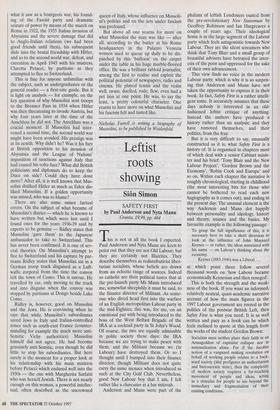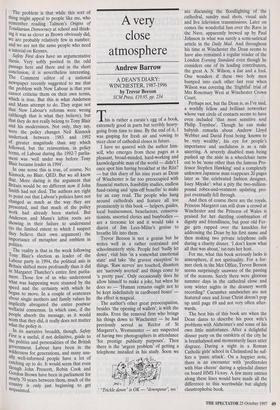Leftist roots showing
Sitin Simon
SAFETY FIRST by Paul Anderson and Nyta Mann Granta, £9.99, pp. 464 This is not at all the book I expected. Paul Anderson and Nyta Mann are keen to point out that they are not Old Labour; but they are certainly not Blairites. They describe themselves as redistributivist liber- tarian socialists, whose beliefs are drawn from an eclectic range of sources. Indeed so catholic are their political tastes that at the pre-launch party Ms Mann introduced me, somewhat sheepishly it must be said, to the finance director of Militant. As some- one who dived head first into the warfare of an English metropolitan Labour party in the mid-Eighties, this was, for me, on an emotional par with being introduced to the boss of the West Belfast Brigade of the IRA at a cocktail party in St John's Wood. Of course, the two are equally admissible in polite society these days: the IRA because we are trying to make peace with them, and the Militant because we (in Labour) have destroyed them. Or so I thought until I bumped into their finance director; though Militant does not quite carry the same menace when introduced as such at the City Golf Club. Nevertheless, good New Labour boy that I am, I felt rather like a charcutier at a bar mitzvah.
Anderson and Mann were part of the phalanx of leftish Londoners ousted from the pre-revolutionary New Statesman by Geoffrey Robinson and Ian Hargreaves a couple of years ago. Their ideological home is in the large segment of the Labour party which feels antagonistic towards New Labour. They are the silent screamers who think that Tony Blair and a small group of beautiful advisers have betrayed the inter- ests of the poor and oppressed for the sake of their own advancement.
This view finds no voice in the modern Labour party; which is why it is so surpris- ing that Anderson and Mann have not taken the opportunity to express it in their book. In fact, Safety First is a rather intelli- gent tome. It accurately assumes that these days nobody is interested in an old- fashioned leftist critique of anything. Instead the authors have produced a history rather than an analysis; and they have removed themselves, and their politics, from the fray.
But it is very difficult to say, unusually constructed as it is, what Safety First is a history of. It is organised in chapters most of which deal with a senior Cabinet minis- ter and his brief: 'Tony Blair and the New Labour Project', 'Gordon Brown and the Economy', 'Robin Cook and Europe' and so on. Within each chapter the narrative is roughly chronological, starting in childhood (the most interesting bits for those who cannot be bothered to read each new hagiography as it comes out), and ending in the present day. The unusual element is the way Anderson and Mann dot happily between personality and ideology, history and theory, nuance and the basics. My favourite example is the following passage:
To grasp the full significance of this, it is necessary here to take a short diversion to look at the influence of John Maynard Keynes — or rather, the ideas associated with his name — on Labour's thinking about the economy.
Keynes (1883-1946) was a Liberal ...
at which point there follow several thousand words on 'how Labour became economically Keynesian and then reneged'.
This is both the strength and the weak- ness of the book. If you want an informed, relatively neutral, quasi-academic narrative account of how the main figures in the 1997 Labour government are rooted in the politics of the postwar British Left, then Safety First is what you need. It is as well written and pacy as a book can be which feels inclined to quote at this length from the works of the student Gordon Brown:
Socialists must neither place their faith in an Armageddon of capitalist collapse nor in nationalisation alone. For if the Jacobin notion of a vanguard making revolution on behalf of working people relates to a back- ward society (and prefigures an authoritarian and bureaucratic state), then the complexity of modern society requires a far-reaching movement of people and ideas, acting as a stimulus for people to see beyond the immediacy and fragmentation of their existing conditions.
The problem is that while this sort of thing might appeal to people like me, who remember reading Talmon's Origins of Totalitarian Democracy at school and think- ing it was as clever as Brown obviously did, we are probably relatively few in number; and we are not the same people who need a tutorial on Keynes. Safety First does have an argumentative thesis. Very softly posited in the odd passage here and there and in the short conclusion, it is nevertheless interesting. The Comment editor of a national newspaper recently suggested to me that the problem with New Labour is that you cannot criticise them on their own terms, which is true. But this is what Anderson and Mann attempt to do. They argue not that New Labour's reforms were wrong (although that is what they believe), but that they do not really belong to Tony Blair and his modernisers. Not only, they say, were the policy changes Neil Kinnock undertook between 1983 and 1992 of greater magnitude than any which followed, but the reinvention, in policy terms, of Labour during the 1992-7 parlia- ment was 'well under way before Tony Blair became leader in 1994'.
In one sense this is true, of course. No Kinnock, no Blair. QED. But we all know that. More daring is the argument that Britain would be no different now if John Smith had not died. The authors are right to point out that Labour's policies have not changed as much as the way they are presented, and that much of the policy work had already been started. But Anderson and Mann's leftist roots are showing in their failure to understand (to the limited extent to which I suspect they believe their own argument) the importance of metaphor and emblem in Politics.
The reality is that in the week following Tony Blair's election as leader of the Labour party in 1994, the political axis in Britain shifted more profoundly than it did In Margaret Thatcher's entire first parlia- ment. Those few of us who understood what was happening were stunned by the speed and the certainty with which he began to move. In a couple of sentences about single mothers and family values he implicitly abrogated the entire postwar welfarist consensus. In which case, if the People absorb the message, as it would seem that they did, it really does not matter what the policy is. In its narrative breadth, though, Safety First is a useful, if not definitive, guide to the politics and personalities of the British government. Labour have been in the wilderness for generations, and many usu- ally well-informed people have a lot of Catching up to do. It would seem that even though John Prescott, Robin Cook and Gordon Brown have been in parliament for nearly 70 years between them, much of the Country is only just beginning to get acquainted.



















































































 Previous page
Previous page